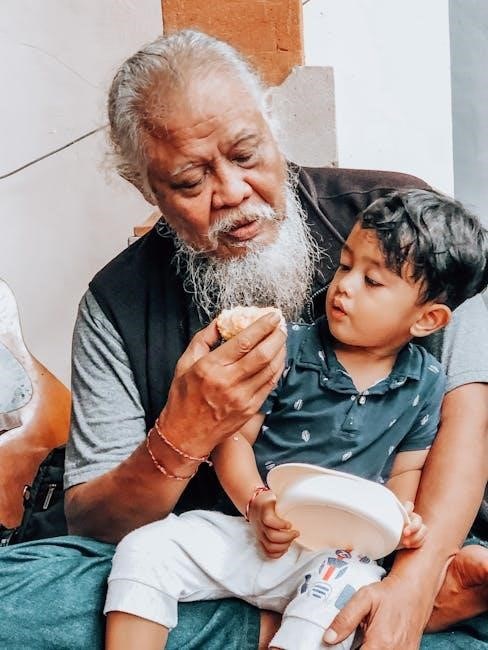Senior center lunch menus provide balanced, nutritious meals for older adults, promoting health and community engagement. Available in PDF format, these menus are easily accessible online.
Overview of Senior Center Lunch Programs
Senior center lunch programs offer balanced, nutritious meals designed to support elderly nutrition and health. Funded by organizations like the Older Americans Act, these programs provide affordable meals, often with a suggested contribution of $2.50. Menus are diverse, featuring options like BBQ pork, baked beans, and tater tots, ensuring variety and dietary needs. Meals are typically served during specific hours, with reservations required for both in-person and Meals on Wheels services. These programs foster community engagement while addressing food insecurity and promoting overall well-being among seniors.

Importance of Balanced Diets for Seniors
A balanced diet is crucial for seniors, preventing chronic diseases and supporting overall health. The Eatwell Guide emphasizes variety, ensuring essential nutrients for well-being in older adults.
The Eatwell Guide and Its Role in Senior Nutrition
The Eatwell Guide provides a clear framework for balanced eating, divided into five main food groups: fruits, vegetables, carbohydrates, proteins, and fats. It recommends proportions to support overall health. For seniors, this guide is particularly beneficial, as it emphasizes nutrient-rich foods to manage weight, maintain energy levels, and reduce chronic disease risks. By following the Eatwell Guide, senior center lunch menus ensure meals are varied, nutritious, and tailored to older adults’ dietary needs, promoting longevity and well-being. This evidence-based approach helps seniors make informed food choices, fostering healthier lifestyles in their golden years. Proper nutrition is essential for aging gracefully.

Sample Senior Center Lunch Menus
Menus often feature options like BBQ pork, baked beans, tater tots, and applesauce. Meals are balanced, nutritious, and tailored to seniors’ dietary needs. Call 734-475-9242 for reservations.
Weekly Menu Examples from Various Senior Centers
Senior centers offer diverse weekly lunch menus, ensuring variety and nutrition. Examples include Monday’s grilled chicken with roasted vegetables, Wednesday’s fish fry with coleslaw, and Friday’s pasta with marinara sauce. Sides like fresh salads, whole grain bread, and seasonal fruits are common. Desserts often feature options like fruit cups or low-sugar treats. Some centers provide themed days, such as “Taco Tuesday” or “BBQ Thursdays,” adding excitement to the menu. Meals are designed to meet seniors’ dietary needs and preferences, promoting health and satisfaction. Menus are typically published weekly in PDF format for easy access.
Downloading Senior Center Lunch Menus in PDF Format
Visit the official website, click the provided link, and download the PDF menu. This offers convenient access to view and print senior lunch options easily.
Steps to Access and Print Lunch Menus
To access and print senior center lunch menus, visit the official website and locate the PDF menu link. Click to download the document, then open it using a PDF viewer. Use the print option to produce a physical copy. Ensure your printer is set to the correct settings for optimal quality. This process allows seniors and caregivers to plan meals conveniently. Many centers also offer archives of past menus for reference. Printing menus is a simple, eco-friendly way to stay informed about daily meal options and special dietary accommodations.

Pricing and Funding for Senior Center Meals

Meals typically cost $2.50 per serving, with funding provided by the Older Americans Act and local health agencies. Contributions are voluntary, ensuring affordability for all seniors.
Cost Overview and Contribution Guidelines
Senior center meals are affordably priced, with a suggested contribution of $2.50 per meal. Funding is provided by the Older Americans Act and local health agencies. Contributions are voluntary, ensuring affordability for all. Meals are subsidized to support low-income seniors, with costs covered by government grants and community donations. This structure allows seniors to access nutritious meals regardless of financial status. Contributions help maintain program sustainability but are not mandatory. The goal is to provide equitable access to healthy food for all older adults in the community.
Community Engagement Through Meal Programs
Senior center lunch programs foster social interaction, reducing isolation among elders. Shared meals create a sense of community and belonging, supported by themed events and activities.
How Lunch Menus Foster Social Interaction
Senior center lunch menus create opportunities for social engagement by offering shared dining experiences. Communal meals encourage conversation and camaraderie, helping reduce feelings of isolation. Themed meals and special events further promote interaction, fostering a sense of community. The structured environment of meal programs allows seniors to connect with peers, building friendships and support networks. Access to PDF menus ensures everyone can plan and participate, making mealtime a meaningful social activity that enriches overall well-being. These programs not only provide nutrition but also serve as platforms for meaningful connections and shared experiences among seniors.
Healthy Eating Options for Seniors

Senior center lunch menus offer a variety of healthy, balanced meals tailored to seniors’ needs, including lean proteins, whole grains, and fresh vegetables, ensuring proper nutrition and dietary accommodations.
Dietary Accommodations and Special Meals
Senior center lunch menus cater to diverse dietary needs, offering options for low-sodium, diabetic-friendly, and vegetarian meals. Many centers provide gluten-free, dairy-free, or low-fat alternatives upon request. Meals are carefully planned to meet nutritional requirements, ensuring seniors with specific health conditions can enjoy balanced and flavorful dishes. Advance requests for special meals are often accommodated, and menus are designed with input from nutritionists to promote overall well-being. This inclusive approach ensures all seniors can access healthy, satisfying meals, regardless of dietary restrictions. Check the PDF menus for detailed options and accommodations available each week.

Seasonal and Special Event Menus
Senior centers feature seasonal and themed meals, incorporating fresh ingredients and festive dishes. Holiday specials and community events highlight their diverse menu offerings.

Themed Meals and Holiday Specials
Senior centers often feature themed meals and holiday specials, such as Thanksgiving turkey dinners or Christmas ham with festive sides. These events create a sense of community and celebration, offering seniors a chance to enjoy seasonal flavors. Menus are carefully crafted to reflect traditional dishes while accommodating dietary needs. For example, summer barbecues or garden parties with grilled vegetables and fresh salads are popular. These special meals not only provide variety but also encourage social interaction and a sense of belonging. Downloading the PDF menus allows seniors to preview and anticipate these delightful culinary experiences.
Partnerships and Sponsors
Senior center lunch programs are supported by partnerships with local organizations and sponsors, ensuring affordable and nutritious meals for seniors through community-funded initiatives and collaborations.
Organizations Supporting Senior Center Meals

Various organizations, including local non-profits and government agencies, play a crucial role in supporting senior center meals. The Older Americans Act funds many programs, ensuring affordable meals for seniors. Catholic Charities and other community groups often partner with senior centers to provide resources and volunteers. These organizations help cover costs, enabling centers to offer subsidized meals. Their contributions also support dietary accommodations and special events, enhancing the overall experience for seniors. By collaborating with these groups, senior centers can maintain high-quality meal services, fostering health and social connections within the community.
Senior center lunch menus are essential for promoting health and social interaction among seniors. They provide balanced nutrition, accessibility, and community engagement, supported by organizations, enhancing overall well-being.
The Impact of Senior Center Lunch Menus on Community Health
Senior center lunch menus significantly enhance community health by providing balanced, nutritious meals tailored to seniors’ dietary needs. These meals improve overall well-being, reduce malnutrition risks, and foster social interaction, combating isolation. By offering affordable, accessible options, they ensure seniors maintain health and independence. The menus also promote education on healthy eating, aligning with guidelines like the Eatwell Guide. Additionally, they strengthen community bonds, creating a supportive environment for older adults. Overall, these programs play a vital role in improving both physical and mental health, making them a cornerstone of community health initiatives for seniors.
